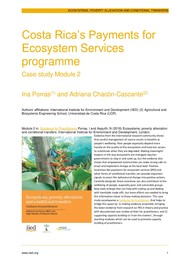Ecosystems, poverty alleviation and conditional transfers

Social conditional transfers (CTs) and payments for ecosystem services (PES) have the same starting point: the assumption that direct, conditional incentives are the most effective way to change behaviour. However, contextual disadvantages affect the capacity for the very poor to comply. Recognising this is important in the design of inclusive, pro-poor instruments. We draw lessons from experiences that have achieved scale by moving beyond pilots or projects into established programmes. Successful CT/PES schemes exhibit a series of enabling conditions: high level political support, sustainable financing streams, lean institutional set-ups, tools and systems for effective implementation, and a clear ability to demonstrate impact.
This handbook and accompanying materials help to bridge this space by: 1) making evidence accessible, bringing the latest evidence from research on PES in theory and practice with documented case studies written for practitioners; and 2) supporting teaching modules which can be used to promote capacity building of practitioners.
The toolkit has a number of related case studies for: India, South Africa; Hindu Kush Himalayas; China; Bangladesh; Mexico; Costa Rica; Brazil; Bolivia/Reciprocal agreements; Carbon offsets (Kenya, Uganda, Mexico), and also PowerPoint presentations for the different training modules: Module 1: context and key insights; module 2 (case studies); module 3 (Sustainable financing) and module 4 (tools). To access these, please visit the ‘Publications’ section of the IIED project linked at the bottom of this page.
Cite this publication
Available at https://www.iied.org/16639iied






